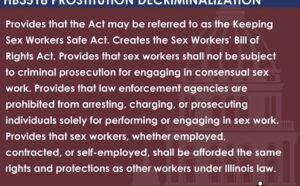PARIS (AP) — France’s government is pushing one of Europe’s toughest laws against prostitution and sex trafficking, and other countries are watching closely. Advocates hope that a draft French law going to parliament Wednesday will help change long-held attitudes toward the world’s oldest profession — by punishing the customer and protecting the prostitute.
The bill, however, is facing resistance in a country with a libertine reputation and a Mediterranean macho streak, and has prompted petitions defending those who buy sex. Signatories include screen icon Catherine Deneuve —who played a prostitute in the cult film “Belle de Jour” — and crooner Charles Aznavour.
Prostitution is currently legal in France, but brothels, pimping and soliciting in public are illegal.
The bill has prompted debate about sex and sexism in France, where former International Monetary Fund chief Dominique Strauss-Kahn is facing charges of aggravated pimping. He denies wrongdoing, though his lawyer has defended Strauss-Kahn’s free-wheeling sex life.
It has also called attention to the evolution of the sex business, as the number of foreign prostitutes, especially from Asia and eastern Europe, has soared in recent years.
The proposed law would introduce a 1,500-euro ($2,000) fine —rising to 3,000-euro at the second offense— for the clients of prostitutes. They could also be forced to attend classes aimed at highlighting the harms of prostitution.
The bill aims to decriminalize the estimated 40,000 prostitutes in France, by scrapping a 2003 law that bans soliciting on the streets, and making it easier for foreign prostitutes to remain legally in France if they enter a process to get out of prostitution. One of the bill’s authors, Maud Olivier, says it’s about “getting rid the consequence of unequal and archaic relationships between men and women.”
Other countries such as Germany, Switzerland and the Netherlands, where brothels are legal, are especially interested in the French experience.
“If France moves, that could be the turning point for other European countries,” said Gregoire Thery, secretary-general of the Mouvement du Nid, an organization which says it helps 5,000 prostitutes in France each year.
The proposed law —written by a group of lawmakers from both right and left and backed by the Socialist government— follows the example of Sweden, which passed similar legislation in 1999.
A report commissioned by the Swedish government showed that the number of people involved in street prostitution in Sweden’s three largest cities dropped from around 730 in 1999 to 300-430 a year in the 10 years after that. At the same time, street prostitution in neighboring Norway and Denmark increased.
The Netherlands went the other way, legalizing prostitution in 2000. But the policy has come in for criticism for playing into the hands of criminals and human traffickers who exploit women. The government is now aiming to crack down on human trafficking by tightening laws.
Supporters of the French draft law argue that it could reduce sex trafficking and empower prostitutes.
“The current law is not on our side so we keep being trapped in that system, and the client knows that, he plays with that. When we hear about ‘prostitution by choice,’ I think that it is still prostitution as violence toward women, and we cannot keep tolerating that violence anymore,” said Rosen Hicher, 57, who was a prostitute from 1988 to 2009.
“One day, a client told me: ‘If you don’t accept to do it without condom, I will call the police,'” she told a news conference. “I was able to say to him: ‘clear off’. But another one wouldn’t because she would be under control of a pimp or would be sold by her husband, her father or her brother.”
Opponents of the French bill argue the opposite, and fear that cracking down will push prostitutes into a dangerous position: Being forced to hide, they would be even more at the mercy of pimps and violent clients, and cut off from the organizations able to help them.
“More clandestine practices means we would find ourselves in more secluded places, and therefore subject to possible violence,” Thierry Schaffauser, a 31-year old escort and spokesman for sex workers’ group Strass, told The Associated Press.
And in dealings with the client, he said, prostitutes would “have less power because when you make less profit, you might have to accept clients that you wouldn’t normally accept, accept doing something you might not have accepted before.”
A contentious open letter titled “Hands off my whore” was released last month by a group of men, including a lawyer for Strauss-Khan, in favor of a man’s right to buy physical pleasure.
And earlier this month, a petition emerged, signed by 60 celebrities, including Deneuve and Aznavour, saying: “Without supporting or promoting prostitution, we reject the penalization of those who prostitute themselves and those who buy their services, and we ask for a real debate without ideological prejudice.”
Among them was a former minister of culture and education, Jack Lang, who told the AP that he is “very cautious about penalizing clients — for reasons of principle, of personal belief, kind of subjective reasons. That must not be a hasty decision.”
Source







 TrafficHolder.com - Buy & Sell Adult Traffic
TrafficHolder.com - Buy & Sell Adult Traffic
I have a feeling the Nordic Model won’t fly in France. I could be wrong as they have had crackdowns on sex commerce of various sorts before (primarily under U.S. influence). But the whole idea is so un-French I doubt it will be embraced and those politicians who do embrace it are in for a rough time at the next election.
If the Nordic model fails to be adopted in France it will be despite the efforts of the French sex worker brigade, which has done little but complain that other interest groups have either come out in opposition to the measure without their permission, or not gone far enough in their public statements.
What’s the French word for clueless?
A counterpoint — the French have historically been harsher toward whores than most of their neighbors:
http://maggiemcneill.wordpress.com/2012/06/02/the-birth-of-a-movement/